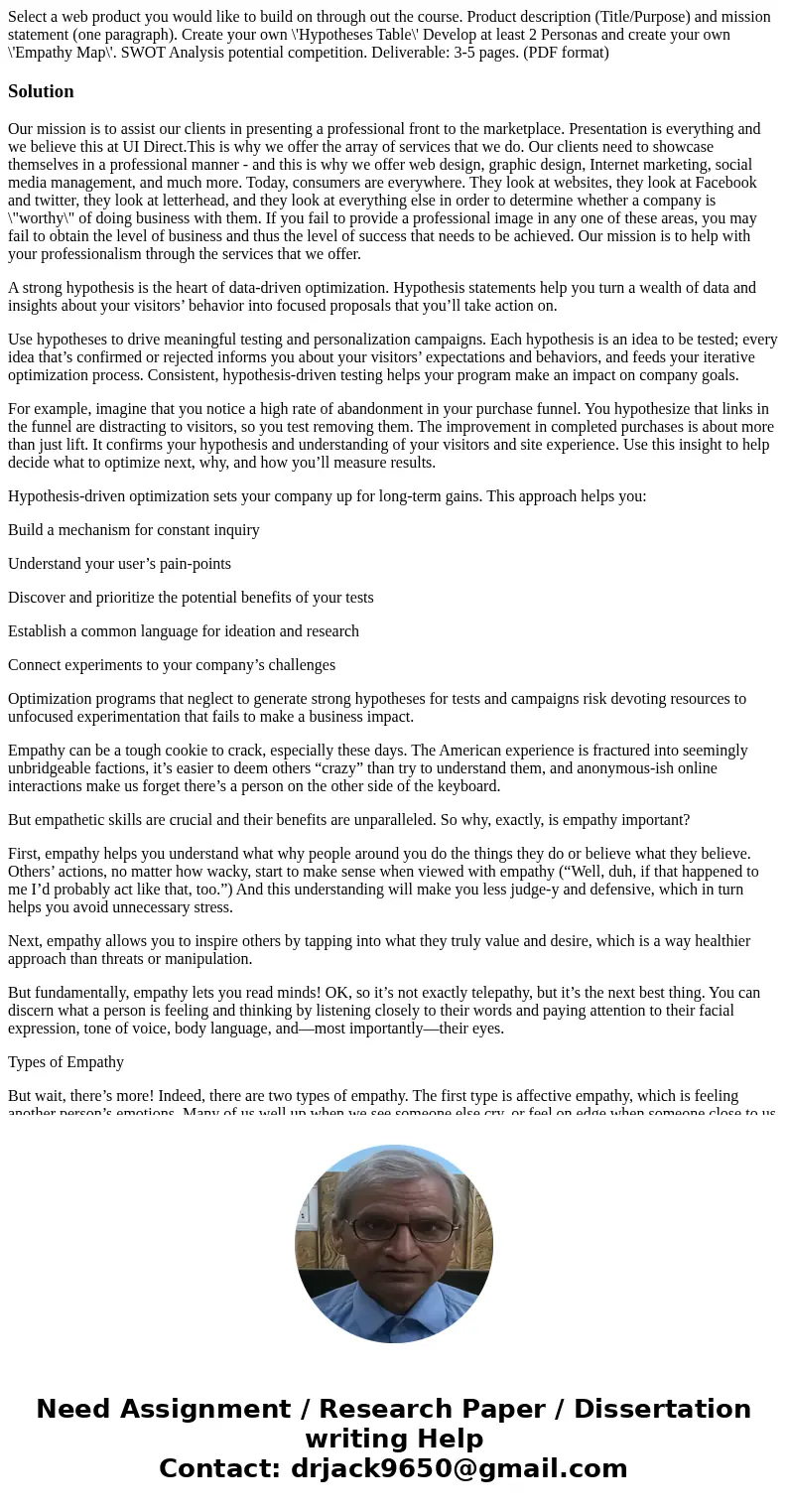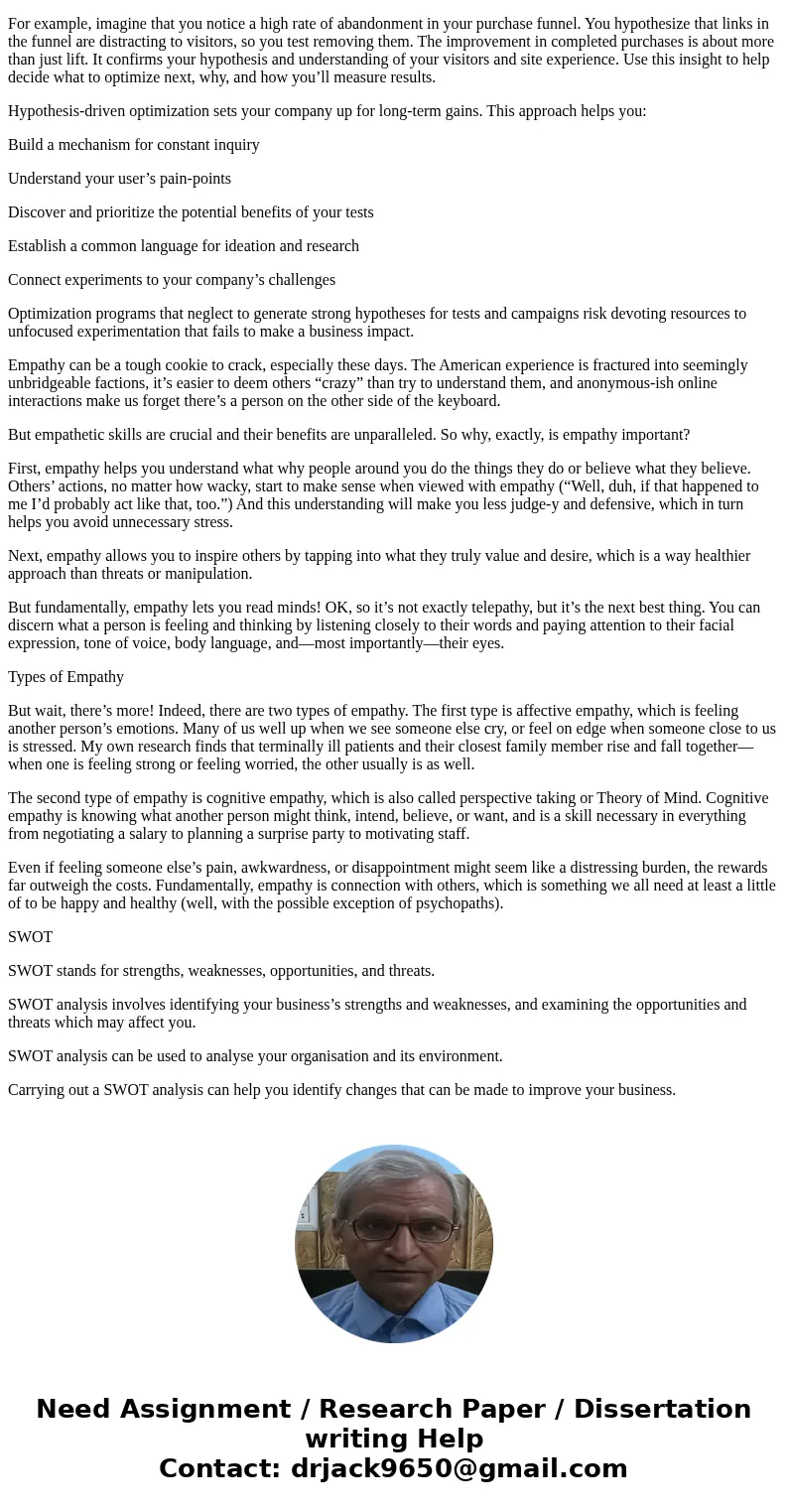Select a web product you would like to build on through out
Solution
Our mission is to assist our clients in presenting a professional front to the marketplace. Presentation is everything and we believe this at UI Direct.This is why we offer the array of services that we do. Our clients need to showcase themselves in a professional manner - and this is why we offer web design, graphic design, Internet marketing, social media management, and much more. Today, consumers are everywhere. They look at websites, they look at Facebook and twitter, they look at letterhead, and they look at everything else in order to determine whether a company is \"worthy\" of doing business with them. If you fail to provide a professional image in any one of these areas, you may fail to obtain the level of business and thus the level of success that needs to be achieved. Our mission is to help with your professionalism through the services that we offer.
A strong hypothesis is the heart of data-driven optimization. Hypothesis statements help you turn a wealth of data and insights about your visitors’ behavior into focused proposals that you’ll take action on.
Use hypotheses to drive meaningful testing and personalization campaigns. Each hypothesis is an idea to be tested; every idea that’s confirmed or rejected informs you about your visitors’ expectations and behaviors, and feeds your iterative optimization process. Consistent, hypothesis-driven testing helps your program make an impact on company goals.
For example, imagine that you notice a high rate of abandonment in your purchase funnel. You hypothesize that links in the funnel are distracting to visitors, so you test removing them. The improvement in completed purchases is about more than just lift. It confirms your hypothesis and understanding of your visitors and site experience. Use this insight to help decide what to optimize next, why, and how you’ll measure results.
Hypothesis-driven optimization sets your company up for long-term gains. This approach helps you:
Build a mechanism for constant inquiry
Understand your user’s pain-points
Discover and prioritize the potential benefits of your tests
Establish a common language for ideation and research
Connect experiments to your company’s challenges
Optimization programs that neglect to generate strong hypotheses for tests and campaigns risk devoting resources to unfocused experimentation that fails to make a business impact.
Empathy can be a tough cookie to crack, especially these days. The American experience is fractured into seemingly unbridgeable factions, it’s easier to deem others “crazy” than try to understand them, and anonymous-ish online interactions make us forget there’s a person on the other side of the keyboard.
But empathetic skills are crucial and their benefits are unparalleled. So why, exactly, is empathy important?
First, empathy helps you understand what why people around you do the things they do or believe what they believe. Others’ actions, no matter how wacky, start to make sense when viewed with empathy (“Well, duh, if that happened to me I’d probably act like that, too.”) And this understanding will make you less judge-y and defensive, which in turn helps you avoid unnecessary stress.
Next, empathy allows you to inspire others by tapping into what they truly value and desire, which is a way healthier approach than threats or manipulation.
But fundamentally, empathy lets you read minds! OK, so it’s not exactly telepathy, but it’s the next best thing. You can discern what a person is feeling and thinking by listening closely to their words and paying attention to their facial expression, tone of voice, body language, and—most importantly—their eyes.
Types of Empathy
But wait, there’s more! Indeed, there are two types of empathy. The first type is affective empathy, which is feeling another person’s emotions. Many of us well up when we see someone else cry, or feel on edge when someone close to us is stressed. My own research finds that terminally ill patients and their closest family member rise and fall together—when one is feeling strong or feeling worried, the other usually is as well.
The second type of empathy is cognitive empathy, which is also called perspective taking or Theory of Mind. Cognitive empathy is knowing what another person might think, intend, believe, or want, and is a skill necessary in everything from negotiating a salary to planning a surprise party to motivating staff.
Even if feeling someone else’s pain, awkwardness, or disappointment might seem like a distressing burden, the rewards far outweigh the costs. Fundamentally, empathy is connection with others, which is something we all need at least a little of to be happy and healthy (well, with the possible exception of psychopaths).
SWOT
SWOT stands for strengths, weaknesses, opportunities, and threats.
SWOT analysis involves identifying your business’s strengths and weaknesses, and examining the opportunities and threats which may affect you.
SWOT analysis can be used to analyse your organisation and its environment.
Carrying out a SWOT analysis can help you identify changes that can be made to improve your business.


 Homework Sourse
Homework Sourse